BOP's 50 Most Romantic Movies: 50-41
February 8, 2006
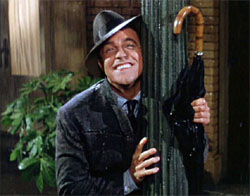 50) Singin' In the Rain
50) Singin' In the Rain
Boy meets girl. Girl hates boy. Boy meets girl again...sparks fly. Roadblocks are overcome, true love prevails...and cut to the credits. Sure, it's formulaic, but when a movie does it right...with the right cast and the right story, it can be magic.
Singin' in the Rain is magical. Gene Kelly is at his suaviest as Don Lockwood, the sex symbol star of the silent film era. The studio has sold the story that he is involved with his frequent co-star, Lena Lamont (Jean Hagen), but he can't stand her. Once he meets the fresh-faced, talented Cathy (played by fresh-faced Debbie Reynolds), he attempts to break free of the fiction of his romance with Lena. In the meantime, the studio converts to talkies and while Don can make the transition, Lena with her squeaky, nasally voice can't. Cathy is forced to rescue the film and reject her feelings for Don. Of course, it all works out in the end, in a fairly predictable way.
What makes it magical is the music. The famous "Singin' in the Rain" scene alone is one of the most romantic scenes of discovering new love ever filmed. You can literally feel the joy as Kelly dances and splashes his way through the title number. Couple this with the simple, yet touching "You Are My Lucky Star"; and while not-so-romantic, the comedic numbers of both "Moses Supposes" and "Make 'em Laugh" make this the movie a treat to watch. If you've got a sweetheart who loves old-time, put a smile on your face, don't-make-'em-like-this-anymore musicals, Singin' in the Rain is the perfect Valentine's treat. (Stephanie DeGateo/BOP)
|
|
|
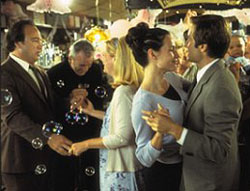 49) Return to Me
49) Return to Me
I tend to fall a little bit on the cynical side so it's a bit of a surprise that Bonnie Hunt's debut directorial feature works so well for me. It is completely sentimental and almost naively sweet and pushes my buttons every time. It's almost an old-fashioned movie where everyone is nice and you root for them all to get what they want. It's old-fashioned except for perhaps the somewhat morbid premise. David Duchovny plays a widower who recently lost his wife in a car accident. Minnie Driver plays a young woman with a heart condition that has been repaired by a heart transplant operation. You can guess what happens from there as Duchovny finds himself unexplainably attracted to Driver. Duchovny and Driver have a very nice chemistry and the supporting cast, including Carroll O'Connor, Robert Loggia, Bonnie Hunt, Jim Belushi, and David Alan Grier, is terrific. If you can handle something on the saccharine side (and if you can't why are you reading a most romantic movies list anyway?), Return to Me will fit the bill as a sweet surprise. (Dan Krovich/BOP)
What happens when your heart is connected to one heart and one heart only to the extent that even putting the organ in a new host fails to kill the coupling? The premise is a reach, to be certain. The idea that a heart transplant does nothing to quell the love felt for a single person is exactly the sort of schmaltzy romanticism we want for this list, though.
Written and directed by masterful comedian Bonnie Hunt, Return to Me is an unexpected step into the realm of optimism for the ordinarily acerbic actress. Sure, most movie goers currently know her as the impossibly fertile mother in the Cheaper by the Dozen franchise, but Hunt's reputation has always been that of a cynic. Seeing her offer such a straightforward, tender take on the concepts of love and emotional attachment was shocking to long-term fans.
The key to the movie's success is in the casting. Few actors in Hollywood resonate with emotional unavailibility the way that David Duchovny does. He is the ultimate in enigmatic actors. To see him lose his beloved wife at the start of the film immediately puts viewers squarely in his camp, hoping for him to re-discover happiness in time.
Similarly, Minnie Driver demonstrated in Good Will Hunting that she has a gift for quirky comedy if given the right setting. Return to Me does just this by allowing her character to be a free spirit unable to soar for much of her life due to health issues. When she is finally in receipt of a functional heart, she has to learn how to live the life she has always dreamed to have. Little does she know that this particular heart comes with a standing emotional attachment.
Sure, the audience knows exactly what the eventuality is with Return to Me but Hunt doesn't hide away from that. In fact, she even celebrates it by casting industry icons Carroll O'Connor and Robert Loggia as knowing onlookers who root for the happy couple to get together just as much as the viewer does. In the end, we all get what we want and with a lush European backdrop thrown in to boot. As we all know, everything is more romantic in Italy. (David Mumpower/BOP)
|
|
|
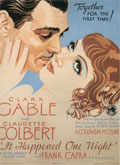 48) It Happened One Night
48) It Happened One Night
It is one of just three films (along with One Flew Over the Cuckoo's Nest and Silence of the Lambs) to ever sweep the four major categories at the Academy Awards - Picture, Director, Actor, and Actress (and each also won Screenplay) - yet It Happened One Night is much more than just a critical darling. It is genuinely funny from start to finish, including one of the all-time great comedic scenes when Peter Warne (Clark Gable) and Ellie Andrews (Claudette Colbert) try to get a ride hitchhiking. Peter goes through a long spiel, trying to impress Ellie about the proper way to flag down a passing car. He has the thumb and fingers technique down perfectly. Things look promising - until one car passes them by. Then another. And another. Finally, out of desperation, the beautiful Ellie lifts up part of her skirt to reveal her long legs to a passing male motorist. And the car stops for them immediately. "Why didn't you take off all your clothes? You could have stopped forty cars," Peter jealously quips.
And more than that, it is a great romance as well. In short, the story is about independent Ellie, daughter of a very wealthy man, who is tired of her father's control over her. She runs away and Peter, a sly newspaper reporter, runs into her. He senses a big story, so he uses her and helps her. In what probably seems very cliched today, the bickering and tension between the unlikely pair eventually leads to romantic feelings for one another. Guided by the great Frank Capra, in the best film of his career, Gable and Colbert build a very believable and likeable relationship. Very much the definition of "romantic comedy," it was (and is) the standard for countless films that followed in its path. (Michael Bentley/BOP)
|
|
|
 47) Lost in Translation
47) Lost in Translation
Two people, lonely and overwhelmed in a country whose customs and habits are completely unique, find comfort in each other for a short period of time. When Bob (Bill Murray) and Charlotte (Scarlett Johansson) find themselves (separately) suffering from insomnia due to extreme jet lag from their travel to Japan, the pair meet in the lounge in their hotel. Over the next few days, they will become close friends as they traverse the streets of Tokyo. From a karaoke adventure to a jaunt through the arcades to a hospital visit, Bob and Charlotte will experience an unexpected slice of life.
As the story progresses, we can see Bob and Charlotte's story as a metaphor for the trajectory of a real-life relationship. In the beginning, everything is sparkly, fun and exciting, leaving them almost breathless. Then, they grow comfortable and easy with one another, and finally we see their bittersweet parting after Charlotte is hurt by Bob's extramarital affair with the singer from the lounge. The catch, of course, is that Bob and Charlotte are not married to each other, nor do they make any real romantic advances toward one another. The final scene where Bob whispers words in Charlotte's ear that only she can hear is one of the most striking and memorable tender moments in modern cinema. (Kim Hollis/BOP)
Romance is always a voyage of self-discovery. When you meet another person and form the genesis of a relationship, you see yourself through their eyes. This new mirror oftentimes reveals aspects of yourself which would have otherwise gone undiscovered. The sublime storyline of Lost in Translation dovetails this theme into the always fertile premise of strangers in a strange land.
Charlotte is a frustrated but inordinately bright young woman struggling to find her place in the world. While on vacation with her photographer husband, Charlotte finds herself all too frequently left alone in a foreign culture. Rather than hide out in her hotel room while life adventures flicker past, she resolutely determines to be an explorer. Her sojourn into the spiritual centers and neon-lit streets of Tokyo reveals to her a prevailing sense of isolation. Despute being married, Charlotte's loneliness is inescapable.
Bob Harris is an aging superstar actor who has lost his sense of purpose in life. He has become exactly the creature he once feared, a sell-out who forsakes the exploration of his profession. Harris has given up on the process of personal improvement, accepting his fate with something resembling dignity. Bob Harris's lot in life is to be famous but vaguely incomplete. The void he feels keeps him from sleeping at night.
When the wise but jaded older man meets the impressionable would-be disciple, sparks fly. A mentor/protege relationship unfolds but not in conventional fashion. There is no passionate embrace, no R-rated sex scene and no outward evidence of romance. What makes Lost in Translation singularly unique in the genre of modern romance is its celebration of subtext. French kissing is replaced by giggles at the emergency room. Flowers and a call the day after are subbed out for a heartfelt 4 a.m. discussion on the nature of monogamy. Betrayal through infidelity is...well, that one stays the same but you get the idea.
Lost in Translation celebrates that life is a journey and your greatest loves are the ones who are most memorable on the ride. You don't need to prove such relationships physically in order to accept their lingering impact emotionally. Oftentimes, the greatest romances are those which never go as far as the couple fantasizes they do. (David Mumpower/BOP)
|
|
|
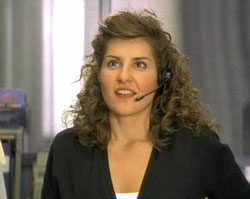 46) My Big Fat Greek Wedding
46) My Big Fat Greek Wedding
The little indie film that was able to leverage cultural comedy into big bucks, My Big Fat Greek Wedding is a safe, sweet, funny romance with plenty of winning performances. It's the story of an ugly ducking of a daughter, Toula (Nia Vardolos), from a Greek family who starts to blossom as she discovers self-reliance. When her confidence increases, she also happens to meet a charming young man named Ian (John Corbett). Soon, the two of them are engaged to be married, and since the title of the movie gives a pretty strong indicator of what happens next, you have a good idea of what's coming.
Toula must try to convince her family that Ian is acceptable marriage material (naturally, they would prefer that she marry another Greek) and at the same time try to keep from being overwhelmed by all of the exhausting details that go into the planning of a wedding in her family culture. Vardalos was winning in her performance, but it was the comedy that revolved around the Greek culture that made the movie click. You're guaranteed to smile and to root for Toula and Ian's happiness. (Kim Hollis/BOP)
|
|
|
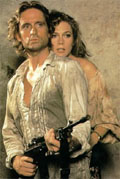 45) Romancing the Stone
45) Romancing the Stone
Believe it or not, there was once a time when both Michael Douglas and Kathleen Turner were considered smoldering hot. In fact, their chemistry in this film and its sequel, The Jewel of the Nile, was so strong, they would eventually work alongside each other in the dark comedy The War of the Roses.
The movie followed the blueprint of Raiders of the Lost Ark, but this story put a female, Turner, as a co-lead. She portrays a romance novelist who must journey to South America in an effort to rescue her kidnapped sister. Once there, she finds herself in plenty of hot water, but is rescued by a soldier of fortune (Douglas), who then goes on to assist her as her adventures continue. Amusingly, their arc follows the typical romance novel plot precisely: they hate each other completely and have nothing in common, but as their journey moves forward, they soon come to have feelings for each other. Throw in a little Danny DeVito for some villainy, double-crossing and comic relief, and it's an ingenious formula for success. Although time has not necessarily been kind to Turner (it's not that long ago that she was playing a drag queen on Friends), it's fun to go back and remember her at the pinnacle of her career. (Kim Hollis/BOP)
Such an unwieldy title for a rom-com, and such an unusual rom-com it is, but, oh, what fun hides beneath its strange name.
The first screen pairing of Michael Douglas and Kathleen Turner is an E-ticket ride of a movie plot, involving stolen gems, kidnapped sisters, soldiers of fortune, and a romance novelist who is so afraid of life that she's rarely ventured out of her New York apartment, much less to a foreign country. But a mysterious package and frantic phone call from her sister sends novelist Joan Wilder to Colombia, where she quickly finds herself in over her head and in need of a friend. Instead she meets Jack Colton, a mercenary who'll do anything for a buck, including taking a fraidy-cat city slicker into the Colombian jungle in search of a group of rather nasty men who want what's in the package: a fabulous stolen gem.
What makes the film work is the chemistry between Douglas and Turner, as well as their by-play with Danny DeVito, who plays the henchman brother of one of the thieves who acquired the eponymous gem. The exotic locales and action/adventure elements are the side dishes; the main course is the romance between Jack Colton and Joan Wilder, who grows through this love into a confident young woman, and goes from being a hopeless romantic to a hopeful one. Quick-witted dialogue keeps the film on track and the focus on the romance when the breakneck pace of the action pieces threatens to derail the plot entirely, while the raucous set-pieces defuse any danger of the movie devolving into a chick-flick weepie. Romantic films don't get much more lively and testosterone-laced, and action/adventure flicks don't wrap around a big as heart as in Romancing the Stone. (Stephanie Star Smith/BOP)
|
|
|
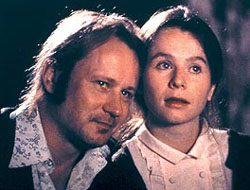 44) Breaking the Waves
44) Breaking the Waves
Ah, the flowers of romance: how sweetly they smell, especially when fed on fresh manure from the compost heap of director Lars Von Trier's heart. Surely there are few romantic films as strange and twisted as the Danish bad boy's Breaking the Waves, which engulfed audiences with nauseating waves of discomfort in 1996.
Released to both critical acclaim and popular disdain - well, at least amongst those subject to motion sickness, which reportedly sent some patrons scurrying for the nearest exit - Breaking the Waves features Stellan Skarsgaard as Jan, a North Sea oil worker whose willowy new wife, Bess (Emily Watson, whose performance earned her an Academy Award nomination for Best Actress), hates to see her man leave the Scottish mainland for a life on the bounding, though in his case stationary, main. Her fears come to fruition when Jan is paralyzed in a work mishap aboard an oil platform, leaving him bedridden and dependent on her care and that of kindly but firm Nurse Dodo (Katrin Cartlidge). Still deeply in love with Bess and unable to overcome a serious case of erectile dysfunction, Jan gives his sexually deprived wife permission to engage in carnal relations with other men. Bess takes up the challenge,reluctantly at first, but then with growing enthusiasm. After all, she rationalizes, her adulterous affairs seem to be assisting in her husband's healing process. God, apparently, works not only in mysterious but also surprisingly naughty ways.
Needless to say, Von Trier's screenplay was not cribbed from the Hallmark card playbook, and Breaking the Waves will not be airing any time soon on the Lifetime Movie Network. A predictably cerebral (and, this being a Dogme film, mischievous) meditation on love in its truest and purest form, it's the perfect date movie for angst ridden young people who are uncomfortable with waxing too enthusiastically about their current beau or belle ideal. For those who can't stand the sight of Meg Ryan and Tom Hanks making goo goo eyes at each other, Breaking the Waves is the perfect antidote. (John Seal/BOP)
Lars von Trier has certainly never been accused of being subtle. Emily Watson gives a tour de force (and Oscar nominated) performance as Bess, an innocent and naive woman who remained a virgin until marriage. She considers her new husband Jan and the sex she gets to have with him as a gift from God. Shortly after their wedding day, however, Jan is injured and parlyzed from the neck down, ending their sex life. Jan's solution is for Bess to have sex with other men while he watches, and Bess complies to appease and remain loyal to her husband. In the hands of Watson and von Trier, Bess' response is the most romantic thing in the world. Her actions come from a complete place of purity. She has conversations with God, and he answers, like a modern day Joan of Arc. She is prepared to completely sacrifice for her love out of faith and total trust in perhaps the most pure example of giving oneself to another put on screen, and by the unforgettable ending she has become a completely believable character. (Dan Krovich/BOP)
Lars Von Trier has a lot in common with Marcel Proust – no one understands him. And Breaking the Waves is a perfect example of why no one understands him. This film is a great love story wrapped up in a metaphysical examination of religious experience bordering on insanity. Reviewers and film critics often describe it as "deeply unsettling and thought-provoking," which is rather similar to calling the Donner Party tragedy "a slight mishap." Emily Watson puts on one of her best performances (if not THE best performance) of her career in portraying Bess, a devout fundamentalist Christian in a truly Puritanical town in Scotland. Bess shocks the town by marrying Jan, an unbeliever portrayed by Stellan Skarsgard. They experience wedded bliss for a short time until Jan suffers a paralyzing injury. From that point forward, the film explores the very depths of romantic love and spiritual devotion – particularly those points in life where the two align perfectly or oppose directly. It is not a "romantic film" in the traditional sense, but a very challenging film in many ways. Not only for its length and subject matter, but for the piercing question that lies at the very heart of the film: What is any one of us willing to do to retain love once we find it? (Joel Corcoran/BOP)
|
|
|
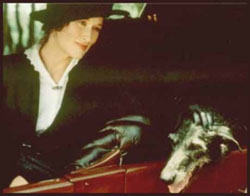 43) Out of Africa
43) Out of Africa
They meet on the veldt of Kenya: he, an enigmatic adventurer, she a woman in a loveless, arranged marriage, trying to carve out an identify in a strange land. Sydney Pollack's Oscar-winning Out of Africa paints a beautifully lyric love story, but one that is challenging and thoughtful. The passsion that exists between Meryl Streep's Karen and Robert Redford's Denys is easy enough to observe, yet difficult to describe. Denys is in love, yet wishes to retain his independence, in a mix of character traits that gives rise to the story's tragic conclusion. Gorgeously photographed and with a beautiful score by John Barry, Pollack's gem stands as an enduring romance and one of the great films of the 1980s. (Tony Kollath/BOP)
|
|
|
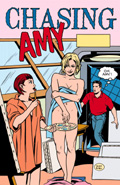 42) Chasing Amy
42) Chasing Amy
"It's not who you love. It's how." This was the tagline for Kevin Smith's third film, Chasing Amy. In an effort to show that he had grown up as a screen writer and filmmaker, Smith decided to give his own spin on a tired genre. Amy followed the not-so-common path of "boy meets girl, boy loves girl, girl is a lesbian, girl loves boy, boy loses girl, boy completely screws everything up."? Ben Affleck was surprisingly solid as comic book artist Holden McNeil. Holden falls in love with fellow artist (and lesbian) Alyssa. Upon learning of her experienced past, Holden can't kill the jealousy and anger inside himself. Egged on by his partner and best friend, Banky (Jason Lee at his best), Holden finds himself torn between the girl he loves (faults and all), his best friend and a myriad of feelings he has no idea how to deal with. Unlike most of the films on this countdown, when Holden finally does figure it out, it's too late. As summed up by Alyssa's last line in the film when asked who Holden is. "Just some guy I used to know." Chasing Amy still stands as Smith's best work and it's really what made me a fan. (Jim Van Nest/BOP)
Kevin Smith is the unlikeliest candidate for a romantic top 50 list in the world for most people. That's because most people haven't seen Chasing Amy, an idiosyncratic comedy about friendship, love, and the way that the past can sometimes seep in unexpectedly.
The movie starred Ben Affleck and Jason Lee (before anyone really knew who they were) as Holden and Banky, two best friends who work together on a comic book called Bluntman and Chronic. They spend their days working in the studio, and then in the evenings they live the typical 20-something existence of hanging out at bars. Their perspective on life begins to shift when they meet Hooper and Alyssa, two homosexuals who help the protagonists learn that people with different sexual preferences aren't nearly as scary as they might have believed. Matters become even more complicated when Holden falls for Alyssa, causing a rift in his friendship with Banky. And although Alyssa returns Holden's feelings, he soon realizes that he simply can't deal with elements of her (very) rich past. As with all Smith films, there is plenty of dialogue, but this time around, the emotions actually resonate a little more deeply. The romance is not entirely a happy one, but it certainly does feel real. (Kim Hollis/BOP)
Few directors celebrate their sophomoric natures to the degree Kevin Smith does. His potty mouth screenplay for Clerks earned the rarest of rare NC-17 ratings for dialogue. The man's lust for sex and Star Wars discussions (or, in a perfect world, both) is a source of much amusement to his disciples. Imagine all of our surprise when Smith produced a startlingly adult treatise on the nature of romance and sexual fluidity. I don't think I would have been more surprised if I witnessed a dog debate quantum physics with Stephen Hawking.
Chasing Amy has become part wives tale and part urban legend by now. The always forthcoming Smith has made no secret of the fact that he spent some time with Go Fish writer/actress Guinevere Turner during a film festival. Their conversations about the nature of relationships had such a profound impact on Smith that he formulated the idea of Chasing Amy. He also named a female character in Mallrats after her.
The actress who played said character, Joey Lauren Adams, developed a relationship with the man the world knows as Silent Bob. Since she was apparently something of a slut before meeting him, Adams became a secondary source of inspiration for the Chasing Amy concept. Smith blended the ideas perfectly by having a vanilla lead character (perfectly cast as Ben Affleck) meet a sexually ambiguous woman with an imposing sexual history, many of which were the inspirations for Penthouse Letters. Nothing says romance to BOP like a film focused upon sluts and lesbians and their impact upon ordinary men.
Chasing Amy might sound like a National Lampoon's straight-to-video title. But the reality is that it is one of the most honest and affecting explorations of cinematic sexuality in the modern era. Smith does not shy away from the aspects of human nature that make the religious right so uncomfortable. Long before Brokeback Mountain's release, he had Jason Lee kiss Ben Affleck in a desperate, immediate exploration of homosexuality. He had a lesbian woman flirt with the idea of loving a man only to return to the aspect of herself she knew to be true. And perhaps impressively, Smith refused to give his most personal directorial effort a Hollywood ending. This newfound maturity is pervasive from start to finish of Chasing Amy, a romantic comedy with ample belly laughs but more greater emotional resonance. (David Mumpower/BOP)
|
|
|
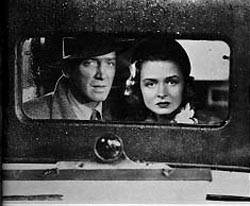 41) It's a Wonderful Life
41) It's a Wonderful Life
If you have yet to see this film, the only logical explanation is that you experience an annually recurring coma each December. It's either that or you are Yogi Bear and you spend the holidays in hibernation. Otherwise, it would have proved impossible to miss this most ubiquitous of holiday movie titles. The only question becomes why we celebrate this production as one of the most romantic films of all time.
On the surface, It's a Wonderful Life appears to be an enigmatic selection. Romance normally does not come in the form of a suicidal protagonist. In addition, George Bailey's life is oftentimes better suited as an early precursor to the Lemony Snickets books. He's rendered deaf during a sledding accident, a pharmacist beats him for saving the man's career, and his Savings and Loan faces foreclosure due to a misplaced payment.
In point of fact, Bedford Falls is every bit as accurate a description of Purgatory as that island on Lost. No matter what George Bailey tries, he just can't follow the advice of the Animals and get out of this place. He's stuck, pure and simple. At this news, Al Bundy would pop a beer and say, "Yeah, that's marriage alright."
We at BOP are not quite that cynical. We don't misunderstand the underlying optimism in this second Frank Capra title on our list. The theme here is simple. Good things do happen to good people. We just don't always understand them as they occur. It's possible that losing one's hearing is a willing trade-off to save the lives of numerous serviceman. Getting beaten down by an awful boss might suck at the time, but at least the man is saved from a lifetime of bitterness. And all of the suffering in the world required to run a Savings and Loan sounds like a phenomenal trade-off if the deal includes multiple impregnations of Donna Reed.
Critics derided It's a Wonderful Life upon its release because it failed to offer the sort of cinematic escapism for which Capra was legendary. Instead, it reminded consumers of all their problems at home. What people missed at the time which has become readily apparent to later generations is the movie's positivity. Does the James Stewart character get kicked around a lot? You betcha. Does he come out of it better for his troubles? Boy howdy. The man gets to have the mother of all romantic evenings dancing to Buffalo Gals. He gets to make the boisterous claim that he will lasso the moon for his love. And he pursues Mary Hatch, wins her over, and begins a fairy tale home life with her and their kids.
For all its pervasive cynicism, It's a Wonderful Life is gift-wrapped in romantic idealism. Good people do find one another, fall in love and grow old together. It's the same underlying philosophy that has made Harlequin Romances best sellers for generations anew. (David Mumpower/BOP)
Most relegate It's a Wonderful Life strictly to the category of "holiday movies," but at its heart, this film is a love story. Frank Capra always declared that the sole message of this masterpiece was very simple: no person is a failure, and every person's life counts. But in the process of bringing that vision to the big screen, he created one of the best love stories ever put on celluloid. The story of George Bailey (James Stewart) transforming from bright-eyed youth ready to take over the world into an embittered, suicidal, middle-aged man is not just a story about one man's (almost literal) descent into hell, but an exploration on themes of how romantic love changes as two people grow together. The scene where George walks Mary Hatch (Donna Reed) home after a mishap during a dance contest includes an almost Shakespearean soliloquy on love: "What is it you want, Mary? What do you want? You...you want the moon? Just say the word and I'll throw a lasso around it and pull it down. Hey, that's a pretty good idea. I'll give you the moon...Well, then you could swallow it. And it'll all dissolve, see. And the moonbeams that shoot out of your fingers and your toes and the ends of your hair..." The film is direct and honest without being saccharine or schmaltzy. George and Mary engage in a courtship in the genuine sense, with all the awkward fumblings and missteps of any romance. Their marriage is as fulfilling and as trying as any great love, and we see Mary suffer George's torments as much as he does. And in the end, we are reminded that love does indeed conquer all, but we have to remember that it doesn't just happen during the Christmas season. (Joel Corcoran/BOP)
How Well Do You Know: It's a Wonderful Life
|
|
|
|
|
|
|

